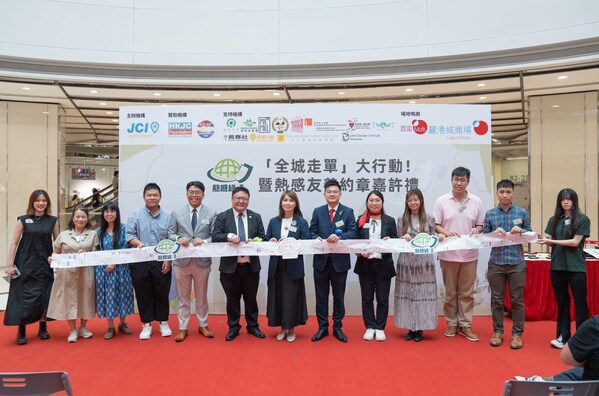"Application and Awareness of Thermal Paper in Hong Kong" - Laboratory Testing and Survey Findings


80% of receipts contain toxins, 70% exceed safety standards; Using receipts for expense claims, e-receipts are eco-friendly and cost-saving
HONG KONG , Aug. 28, 2024 /PRNewswire/ -- In today's fast-paced and highly consumer-driven society, thermal paper has become an indispensable part of our daily lives, used for printing receipts, invoices and other transaction documents. However, the use of thermal paper poses environmental and health challenges. These papers often contain harmful substances, such as Bisphenol A (BPA), and cannot be processed by conventional recycling systems. Their widespread usage also puts immense pressure on forests and natural resources.
To address the issues surrounding thermal paper usage, the JCI North District has launched the "Thermal Green" initiative, taking a holistic approach to increase social awareness of thermal paper and promote its reduced usage and the adoption of sustainable alternatives.
The JCI North District conducted public surveys and thermal paper laboratory testing from May to August, with the results as follows:
According to the thermal paper testing results, 10 local merchants were sampled, reflecting that 80% of them use BPA-containing thermal paper, and 70% of the samples exceeded the safety level set by the European Food Safety Authority. Among the test results, the sample with the highest phenol content was a receipt from a large department store (78mm x 362mm, Sample G), containing 14.79mg of BPA. Compared to the tolerable daily BPA intake of 3.5mg for a 70kg adult, the test result indicates that the BPA content in the receipt exceeds the safety standard by more than 4 times.
In the survey aspect, a total of 1,155 questionnaires were successfully collected. The survey included 22 questions, with approximately 90.4% (1,044) of the respondents being individuals and 9.6% (111) being companies. The findings reveal that most citizens receive thermal paper receipts primarily for expense reimbursement purposes, reflecting the feasibility of promoting e-receipts. Additionally, over half of the surveyed companies lack sufficient knowledge about the source and composition of the thermal paper they use.
Key findings include:
Mr. Yiu Ka-ming, President of the JCI North District, said, "The survey results show that many respondents encounter at least 2-3 thermal paper receipts per day, with 'receipts' being the most common type of thermal paper encountered by citizens and companies. This reflects the important role that thermal paper plays in our and merchants' daily lives. However, the survey findings also reveal that many companies lack sufficient knowledge and understanding of thermal paper, such as 58.6% of surveyed companies being unaware of the source of the thermal paper they are using, and 89.2% being unaware of whether the thermal paper contains phenol or not. As stakeholders in social development, companies have the need and responsibility to understand and reduce the environmental impact of their operations."
Ms. Yip Wing-wa, Secretary General of the Junior Chamber International Hong Kong, said, "Citizens are relatively passive in this matter, as they have no choice in the type of thermal paper receipts they receive, and sometimes cannot avoid receiving physical receipts due to work requirements. Therefore, to solve the problem, a multi-pronged approach is needed. Merchants and transaction system companies need to collaborate on the electronic front, and more importantly, starting from the educational level by empowering citizens as the root source, promoting source reduction. Both merchants and citizens need to be aware of the types of thermal paper they are using and the associated hazards, and then take actions to improve the situation. In fact, citizens only need to simply say 'No need, thank you!' to merchants, and that can already bring significant results."
Mr. Lam Cheuk-yiu, Chairperson of the Organizing Committee, said, "Although the European Food Safety Authority's standard is the tolerable daily BPA intake, given the survey results showing that each person encounters at least 2-3 thermal paper receipts per day and the high BPA content in the receipts, citizens' exposure and potential intake are unavoidable. On the other hand, companies often do not choose to change due to economic or administrative reasons, but in fact, transitioning to an electronic receipt system may not necessarily burden them financially, and may even save economic or administrative costs, while enhancing the company's reputation - a win-win situation."
This initiative is currently being implemented in phases, building on the findings from this testing and survey, coupled with the "Thermal Green" Friendly Charter and collaborations with various organizations. We aim to raise social awareness of the thermal paper usage issue and encourage merchants to choose more environmentally friendly and sustainable alternatives, promoting environmental awareness and driving eco-friendly practices as a new trend.

The "'No Receipts' Campaign! and Thermal Friendly Charter Presentation Ceremony" was successfully completed on Saturday, August 17, 2024.
About Thermal Green
In modern society, thermal paper is widely used in various industries, especially in retail, catering, and service sectors. It is used for printing receipts, invoices, orders, tickets, medical reports, and many other daily transactions and records. While the use of thermal paper is convenient, it also has some problems. It is a single-use product that cannot be recycled, leading to massive paper waste. Moreover, the colorants in thermal paper are mostly "Bisphenol A" (BPA), a chemical substance that is believed to pose potential health risks and even contaminate soil and oceans.
To raise awareness about the issues surrounding thermal paper, the "Thermal Green" initiative was launched. Through surveys, in-depth studies, and the "Thermal Friendly Charter," this initiative aims to take concrete actions to help individuals and organizations reduce their use of thermal paper and promote more sustainable practices.
About the Organizer - JCI North District
The JCI North District was established in 1985 and is one of the 21 chapters under the Junior Chamber International Hong Kong. Through four major development opportunities - "Individual, Business, Community, and International" - the organization engages young people aged 18 to 40 in various projects to serve the community, train, and enhance themselves, creating positive changes.